| Srl | Item |
| 1 |
ID:
156609
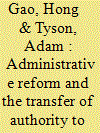

|
|
|
|
|
| Summary/Abstract |
In this article, we examine the administrative functions that have been carried out by social organizations (SOs) in China since 2013. We use evidence from Guangdong to demonstrate that the transfer of authority to SOs is selective, tends to create more burdens for local government, and generally does not lead to greater autonomy for SOs. We focus on five types of SOs that are undertaking new administrative functions with varying degrees of operational autonomy, which relates to the consultative authoritarian model proposed by Jessica Teets. Consultative authoritarianism allows for the expansion of relatively autonomous SOs and the development of indirect state control mechanisms. The model is designed to improve governance without democratization by expanding the role played by intermediaries such as SOs in public administration and service delivery. The evidence from Guangdong permits us to conclude that the transfer of authority to SOs allows for innovations in public administration, but that politics continues to motivate government decisions as to which functions are suitable for SOs to undertake, casting doubt on the ability of the Chinese Communist Party to achieve sustainable improvements in local governance and public service provision.
|
|
|
|
|
|
|
|
|
|
|
|
|
|
|
|
| 2 |
ID:
104106
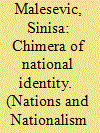

|
|
|
|
|
| Publication |
2011.
|
| Summary/Abstract |
In both popular discourse and many academic works, the existence of national identity is largely taken as given. Although researchers disagree on whether national identities are modern or perennial, and how best to gauge the intensity of identification with a particular nation, there is near unanimity on the view that national identities are real and perceptible entities. In contrast to this view I argue not only that there was no national identity before modernity but also that there is little empirical evidence for the existence of national identities in the modern age either. While it is obvious that many individuals show great affinity for their nations and often express sincere devotion to the 'national cause', none of these are reliable indicators of the existence of a durable, continuous, stable and monolithic entity called 'national identity'. To fully understand the character of popular mobilisation in modernity it is paramount to refocus our attention from the slippery and non-analytical idiom of 'identity' towards well-established sociological concepts such as 'ideology' and 'solidarity'. In particular, the central object of this research becomes the processes through which large-scale social organisations successfully transform earnest micro-solidarity into an all-encompassing nationalist ideology.
|
|
|
|
|
|
|
|
|
|
|
|
|
|
|
|
| 3 |
ID:
190409
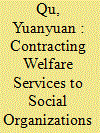

|
|
|
|
|
| Summary/Abstract |
As part of a broader direction of welfare and governance reforms, China has launched a policy to contract welfare services out to social organizations. Scholars have explored the implementation of the policy in a few socioeconomically advanced cities such as Guangzhou, Shenzhen and Shanghai. In this article, we examine how local governments lacking nongovernmental services suppliers or resources for contracting respond to the policy. We developed a framework of multiple logics to analyse services contracting in a county-level city in eastern China. We found that local officials follow three logics in implementing the policy: to meet the central state's targets, to balance policy outcomes and risks, and to stimulate a more participatory society. This generates a mix of policy behaviour, including entrepreneurialism, welfarism, innovation, risk-sharing and collaboration. We thus argue the interplay of the logics determines the local policy process of services contracting in China.
|
|
|
|
|
|
|
|
|
|
|
|
|
|
|
|
| 4 |
ID:
158032
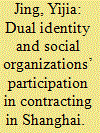

|
|
|
|
|
| Summary/Abstract |
Chinese governments, driven by both pragmatic and legitimacy purposes, have been enthusiastically engaging social organizations in service contracting to meet rising service demands. This article argues that social organizations’ participation in contracting is shaped by their dual identity as state agents and social actors. Such a dual identity is forged by China’s institutional environment and its internal tension may create both incentives and disincentives for contracting. Using the data from the competitive contracting for the social service program in Shanghai (2009–2013), the article finds intriguing evidence that both identities had positive influences on social organizations’ participation. Social organizations actively participated to demonstrate loyalty and manage their relations with government, as well as to seek new resources, social visibility and professional capacities. They reconciled the two identities by adopting multiple strategies. Further analysis reveals how contracting has been adapted to the social-administrative system in China.
|
|
|
|
|
|
|
|
|
|
|
|
|
|
|
|
| 5 |
ID:
177963
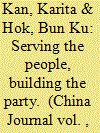

|
|
|
|
|
| Summary/Abstract |
The reform era has been associated with the waning authority of the Chinese Communist Party in urban society. While existing studies have investigated the Party’s self-reinvention through the incorporation into its ranks of professional groups and the new socioeconomic elite, much less attention has been given to how the Party has rebuilt its presence in neighborhoods among urban residents and migrant communities. Drawing on a case study in Kunming, this article argues that the Party has sought to deepen its territorial reach and regain political relevance by emphasizing welfare provision and service delivery at the grassroots. The rise of service-centered Party-building has seen increased co-optation of previously independent social organizations as “partners” and “collaborators” in service provision. Enrolling NGOs enables the Party to both revamp its image as a paternalistic redistributor and regain its ability to mobilize the masses through appropriating the vocabulary of participation and volunteerism that social organizations espouse. If in co-opting the professional and business elite the Party has successfully fused Party authority with market power, at the urban grassroots it has appropriated social forces to reestablish its presence and bolster its legitimacy, with important implications for the autonomy and professionalism of NGOs.
|
|
|
|
|
|
|
|
|
|
|
|
|
|
|
|
| 6 |
ID:
129270
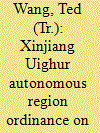

|
|
|
|
|
| Publication |
2012.
|
| Summary/Abstract |
The article presents information regarding the ordinance on education for ethnic unity by Xinjiang Uighur Zizhiqu, China. It mentions that the ordinance is enacted according to the rules and regulations of the Constitution of the People's Republic of China. It discusses the applicability and the acceptance of ethnic unity education by state organs.
|
|
|
|
|
|
|
|
|
|
|
|
|
|
|
|